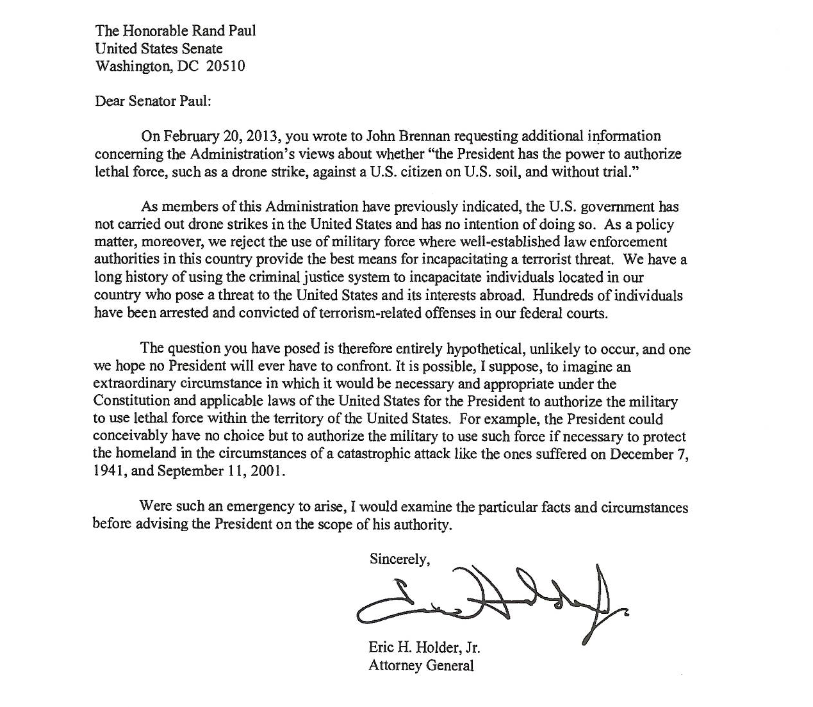Between having to admit that it was too big to prosecute (TBTP) the Too Big To Fail (TBTF) banks, his testimony on the legality of targeted assassinations and having to clarify lethal drone attacks on Americans in America after Rand Paul’s thirteen hour filibuster, Attorney General Eric Holder has not has a good week.
In his testimony before the Senate Judiciary Committee, AG Holder responded to Iowa Republican Sen. Chuck Grassley’s concern that the “mentality of too-big-to-jail in the financial sector” was leading to the spread of terrorism (re:HSBC) with this:
HOLDER: The concern that you have raised is one that I, frankly, share. And I’m not talking about HSBC now. That (inaudible) be appropriate.
But I am concerned that the size of some of these institutions becomes so large that it does become difficult for us to prosecute them when we are hit with indications that if you do prosecute, if you do bring a criminal charge, it will have a negative impact on the national economy, perhaps even the world economy. And I think that is a function of the fact that some of these institutions have become too large.
Never mind laundering money for terrorist activity and giving it a pass, it’s all about protecting the world’s 1%. The Federal Reserve just keeps handing them $83 billion in handouts every year while Obama negotiates away Social Security and Medicare benefits at fancy dinners in Washington posh hotels with Republicans.
If they’re TBTP, then it time to break them up
Then came Kentucky’s Republican Sen. Rand Paul’s pique over Mr. Holder’s failure to answer three inquiries regarding armed drone attacks on Americans on American soil. Sen Paul’s 13 hour filibuster which at times bizarre (you try talking for that long and not sound a little weird) causing Mr. Holder to back off on his assertion that the president can do just that. In his second letter, Mr. Holder told Sen. Paul that the president would not have the authority to order a drone to kill an American citizen on U.S. soil who was “not engaged in combat.”. How nice, he can’t use drones. But AG holder can take solace, the author of the Bush administration legal memos justifying the use of torture, John Yoo, thinks thinks “President Obama is really getting too much grief over targeted killing“:
“I admire libertarians but I think Rand Paul’s filibuster in many ways is very much what libertarians do, they make these very symbolic gestures, standing for some extreme position,” said Yoo, now a UC Berkeley law professor, who once suggested it was okay for the president to order a child’s testicles be crushed. Referring to Paul’s marathon filibuster, an attempt to force the Obama administration to clarify its views on the use of military force against terror suspects in the United States, Yoo said “It sort of reminds me of young kids when they first read The Fountainhead or Atlas Shrugged and they suddenly think that federal taxation equals slavery and they’re not going to pay any federal taxes anymore.” Yoo’s statements were made on a conference call Thursday held by the Federalist Society, an influential conservative legal organization.
Now that’s an endorsement you can take to a war crimes trial.
It is unconstitutional to target a group or an individual without due process under Article I, Section 10, Clause 1 of the Constitution which bans bills of attainder, and the Fifth Amendment.
So long as this president has a list of people he thinks can be targeted for assassination without due process, by armed drone or any other means, there are should to be questions and not just from a handful of Tea Party Libertarians. As for AG Holder, if he can’t prosecute banks or uphold the Constitution, then he should be fired, resign or impeached.


 Popular Venezuelan President
Popular Venezuelan President
Recent Comments